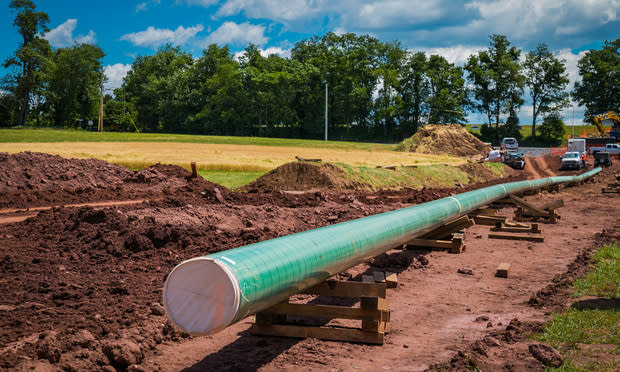11th Circuit Issues Pipeline Ruling Against Landowners

(Photo: George Sheldon/Shutterstock.com)
The Transcontinental Gas Pipeline Co. and its Atlanta lawyers have won an important victory with a ruling from the U.S. Court of Appeals for the Eleventh Circuit approving a 115-mile path through private property in Northwest Georgia.
“We conclude that the district court properly granted summary judgment in favor of Transcontinental on its claim for condemnation under the Natural Gas Act,” Judge Julie Carnes said in a 90-page opinion released Thursday. “We further conclude that the district court did not abuse its discretion in issuing a preliminary injunction granting Transcontinental immediate access to Defendants’ properties conditioned on Transcontinental posting a surety bond in an amount equal to twice the appraised values of the interests condemned.”
The panel joining Carnes included Judge Jill Pryor with Judge Anne Conway of the Middle District of Florida, sitting by designation. They affirmed U.S. District Judge Eleanor Ross of the Northern District of Georgia.

W. Clay Massey of Alston & Bird
William Clay Massey of Alston & Bird argued for the company at oral arguments in September. His team included Nowell Berreth, Phil Sandick, Nicole DeMoss and Tony Greene. Alston & Bird deferred to the company for comment. A spokesman for Transcontinental issued a statement applauding the decision.
Transcontinental said the decision “settled or confirmed in our favor many condemnation issues with broader application" to other projects. Carnes has provided "a clear road map for deciding in our favor a wide variety of challenges that are made to our use of eminent domain under the Natural Gas Act, both in the District Courts within the Eleventh Circuit and elsewhere,” Transcontinental said.
“The Eleventh Circuit joins other U.S. Circuit Courts around the country in holding that a district court may, in appropriate circumstances, issue a preliminary injunction granting a pipeline company immediate access to property that it has an established right to condemn under the Natural Gas Act,” Transcontinental said. “Gaining immediate access is a key step in the efficient and timely construction of interstate natural gas transmission pipelines.”
The ruling came as a blow to property owners affected. They have a long list of attorneys. Donald Evans Jr. of Evans Law Firm in Cartersville took the lead at oral arguments.
“My landowners are, of course, disappointed by the Eleventh Circuit’s ruling,” Evans said Friday. “It’s been two years since this case was filed. The pipeline is completely built. They’ve been running gas through it for over a year, and my clients haven’t been paid a cent for the occupation of their property. That among many other issues are real concerns when the federal court has allowed the district court discretion to override eminent domain law.”
The battle goes back to 2013, when Transcontinental first began contacting land owners in the area in which the company planned to place a natural gas pipeline connecting the Gulf Coast to New York City, according to Carnes.
In 2015, Transcontinental applied to the Federal Energy Regulatory Commission for a certificate of public convenience and necessity authorizing it to construct a new natural gas pipeline in northwest Georgia, as well as related facilities in Georgia, North Carolina and Virginia.
The new 115-mile lateral pipeline was planned to run from a compressor station on Transcontinental’s mainline in Coweta County, Georgia, to meter stations in Murray County, near the city of Dalton. The purpose of the project was to enable Transcontinental to transport natural gas extracted from the Marcellus shale and other supply basins in the northeastern United States to customers in the Southeast and Gulf Coast, Carnes said. Transcontinental was to receive the gas at a point on its mainline in Mercer County, New Jersey, and deliver it to an interconnection with another company’s pipeline in Mississippi. Along the way, Transcontinental would provide natural gas to its customers, including, through the new lateral pipeline, communities in northwest Georgia. This project, which included both the new lateral pipeline and the related facilities on Transcontinental’s mainline, was called the Dalton Expansion Project.


